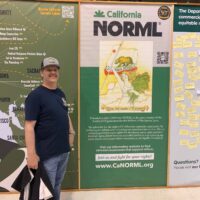CaNORML kicked off 2010 with a major legalization blitz in Sacramento, asking all activists to contact their Assemblymembers about AB390, Tom Ammiano’s landmark legalization bill that was sponsored by CalNORML. On January 12, the Assembly Public Safety Committee voted to approve the bill, the first time a legislative body has ever voted to repeal MJ prohibition. The bill was resubmitted as AB2254 and back burnered pending the results of the vote on Prop. 19.
CalNORML was back in Sacramento in February, when in a landmark report to the state legislature, the California Center for Medicinal Cannabis Research announced that its studies have shown marijuana to have therapeutic value in six different human clinical trials regarding chronic pain, spasticity and vaporization. California NORML, which has promoted research on vaporizers, advised CMCR researcher Dr. Donald Abrams on their study.
In March, State Sen. Mark Leno (D-SF) announced the introduction of a bill (SB1449) to downgrade possession of one ounce or less of marijuana to an infraction instead of a misdemeanor. California NORML supported SB 1449 after making sure it was rewritten so as not to raise the present $100 fine. The Senate Public Safety committee passed the bill on 4/20.
In April, a bill that would drastically limit medical marijuana dispensary siting was introduced by Assemblymember Joan Buchanan (D-Contra Costa). As originally introduced, AB 2650, would have forbidden any medical marijuana collective, dispensary or other provider from being located within 1000 feet of a school. CalNORML successfully lobbied to change the distance to 600 feet, the same as for alcohol.
The California Board of Equalization reported in May that the state is collecting some $100 million in sales taxes from medical marijuana, confirming the estimate previously published in an economic analysis by California NORML. A subsequent analysis by the RAND institute confirmed Cal NORML’s estimates on the cost of marijuana enforcement ($200 – 300 million in California) and state consumption of marijuana (1 million pounds per year).
In June, California NORML joined Tehama County patients to file suit against a county ordinance that limits their right to grow marijuana at home. The Tehama ordinance declares it a public nuisance to grow marijuana anywhere within 1,000 feet of a school, school bus stop, church, park, or youth facility. California NORML attorneys argue that local governments cannot legally declare activities that are protected by state law to be nuisances. The Tehama suit is expected to be heard this winter.
Cal NORML opposed a mischievous bill by Sen. Ron Calderon to tax medical marijuana at a 41% rate like tobacco. The bill was withdrawn, but then Calderon tried to push through another bill that would have required all commercial growers, retailers, wholesalers, and transporters to register with the state, without providing them any legal protection. CalNORML also opposed this bill, which was withdrawn but could well be revived next year.
California NORML consulted on an ambitious proposal to establish a large-scale industrial size medical marijuana growing facility in Oakland. When the city ultimately approved an ordinance that would license just four large-scale grows for $211,000 per year, Cal NORML protested that the proposal failed to allow for the city’s many small-time growers and processors. Oakland’s city attorney raised questions about the legality of the measure, which has also attracted interest from the DEA. California NORML has continued to favor measures that would legally protect small-to-moderate growers, while backing stricter controls and taxes for larger, commercial facilities.
On September 30, Gov. Arnold Schwarzenegger signed SB1449 (Leno), making marijuana possession an infraction with no criminal record, marking the first time in 35 years that penalties for non-medical use of marijuana have been reduced in California. California NORML originally called for making petty possession an infraction when the state passed its landmark decriminalization law in 1975, but the legislature made it a minor misdemeanor. Misdemeanor possession arrests in California have mounted to new highs in recent years, reaching 61,164 in 2009. SB 1449 takes effect on Jan 1, 2011.
With the November election looming, California NORML fielded countless press inquiries about some of the issues raised in the Prop. 19 campaign, publishing op-eds to counter opponents’ phoney charges about workplace and driving safety. On November 2, Prop. 19 carried 46% of the California vote and cities and counties passed all 13 of their measures to tax medical or recreational marijuana (had 19 passed).
In the aftermath of Proposition 19, California NORML will host a statewide conference to discuss the future of marijuana reform efforts in California at the David Brower Center in Berkeley on Saturday, January 29, 2011.



